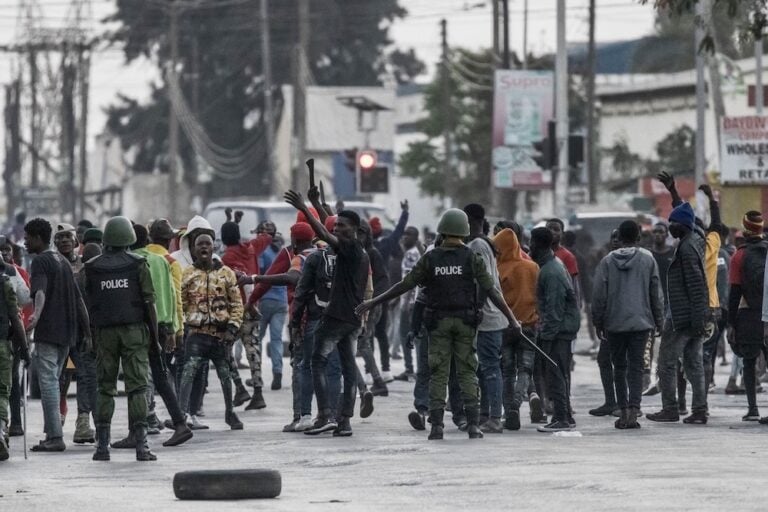(MISA/IFEX) – The Zambian government has detained opposition leader Dean Mungomba and is said to be hunting for outspoken civil rights leaders and journalists following the failed coup against the government of President Frederick Chiluba on 28 October 1997. A Zambia police spokesman said that Mungomba, who is President of the opposition Zambia Democratic Congress […]
(MISA/IFEX) – The Zambian government has detained opposition
leader Dean Mungomba and is said to be hunting for outspoken
civil rights leaders and journalists following the failed coup
against the government of President Frederick Chiluba on 28
October 1997. A Zambia police spokesman said that Mungomba, who
is President of the opposition Zambia Democratic Congress (ZDC),
was picked up in the capital, Lusaka. No further details were
given and it is not known where he is being held. Further
attempts have been made to arrest several more.
A family spokesman of ZDC Secretary General Azwell Banda said
that police went to Banda’s home on 31 October, but did not find
him. Former President and leader of the opposition United
National Independence Party (UNIP) Kenneth Kaunda, UNIP chairman
Malimba Masheke and human rights lawyer and politician Roger
Chongwe are the other targets. They are all presently out of the
country.
President Chiluba said yesterday that there were “big brains”
behind the coup and they would soon be picked up. His spokesman
said earlier that the government would probe Masheke following
statements attributed to him saying the volatile political
situation in Zambia was responsible for the failed coup. Among
the journalists targeted are “The Post” newspaper editors Fred
M’membe, Arthur Simuchoba and Matsautso Phiri as well as
journalist Dickson Jere.
M’membe, who has been a target of harassment from the Zambian
government before, said he believed the clampdown is a desperate
move by the government to silence dissent. “They want to create
an artificial impression that people are in support of them by
killing all criticism on government during this period,” M’membe
said. “The Post” carried the most extensive coverage on the coup
attempt and has previously been the leading paper in giving a
voice to critical views on the government.
There are widespread fears that the Chiluba government will use
emergency powers to crush its perceived enemies even though they
were unconnected to the coup attempt. Under the state of
emergency declared by President Chiluba on 29 October, police
have been given sweeping powers to search homes and other
buildings and to detain anyone for longer than the 24 hour limit
demanded by the country’s Constitution. The government said it
needed emergency powers to be able to interrogate people for
longer periods. This interrogation has previously included brutal
torture and there are known cases of deaths and grievous bodily
harm during these detentions.
On 28 October, Zambia army captain Stephen Lungu led a contingent
of junior army officers and announced the takeover of state power
on national radio. Four hours later, a commandzo unit of the
Zambia army overran Lungu and crushed the coup. President Chiluba
has since declared a state of emergency to deal with the
situation.
MISA recommends that all media freedom and human rights
campaigners keep a close eye on developments in Zambia.
Recommended Action
Send appeals to authorities:
unnecessarily abused during this time
families and lawyers and should be afforded a fair and open trial
Appeals To
His Excellency President Frederick Chiluba
Republic of Zambia
State House
Independence Avenue
P.O. Box 30208
Lusaka, Zambia
Fax: +260 1 221939
E-mail: state@zamnet.zm or mfalus@zamnet.zmRt. Hon. Minister David Mpamba
Minister of Information and Broadcasting Services
P.O. Box 51025
Lusaka, Zambia
Fax: 260 1 253456Rt. Hon. Ernest Mwansa
Deputy Minister of Information and Broadcasting Services
P.O. Box 51025
Lusaka, Zambia
Fax: +260 1 253456
Please copy appeals to the source if possible.


